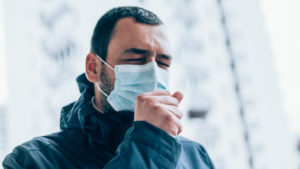Long COVID: key facts for doctors

Here are key facts on Long Covid for doctors.
Definition
- Long COVID, also known as Post-Covid Syndrome, affects patients who experience persistent symptoms beyond 12 weeks.
Prevalence
- It is thought 5-10% of COVID-19 patients develop Long Covid.
Symptoms
- These are non-specific but include fatigue, breathlessness, muscle pain, and cognitive impairment.
Pathophysiology
- The exact mechanisms are unclear, but potential contributing factors include chronic inflammation, immune system dysregulation, and endothelial damage.
Diagnosis/Assessment
- Comprehensive history and examination are crucial
- There is no specific test for Long COVID
- Consider investigations like spirometry, echocardiography, and blood tests to rule out other causes.#
Blood (and other) tests for Long COVID
- Urine tests
- Urinalysis for protein, blood and glucose
- Urinary ACR
- Haematology
- Full blood count
- Erythrocyte sedimentation rate (ESR) and C-reactive protein (CRP)
- Biochemistry
- Urea and electrolytes
- Random blood glucose, and HbA1c
- Liver function tests
- Bone biochemistry
- Other blood tests
- Thyroid function tests
- Screening blood tests for coeliac disease (gluten sensitivity) – e.g. IgA and IgG anti-tissue transglutaminase (tTG) antibodies
- Creatine kinase (CK)
- Ferritin
- Autoimmune blood screen (e.g ANA, DsDNA, ENA, C3/4, Igs, SEP/SFLC, Rh factor)
- Other tests
- MSU- M,C&S
- Chest x-ray (CXR).
Note. ANA, dsDNA and ENA rates are high in Long COVID patients. They may not mean the patient has lupus (SLE), for example.
Management
- There is no specific treatment
- Therefore treatment focuses on symptom management, rehabilitation, and multidisciplinary support, e.g.
- Fatigue management: Encourage pacing activities, rest breaks, and relaxation techniques
- Breathing exercises: Refer to respiratory physiotherapy for breathing exercises and pulmonary rehabilitation
- Pain management: Consider analgesia, physiotherapy, and alternative therapies like acupuncture
- Cognitive rehabilitation: Refer to occupational therapy or cognitive rehabilitation programmes.
Mental health support
- Screen for anxiety, depression, and PTSD; provide psychological support and referrals as needed.
Referral
- To specialist services may be necessary.
Resource
NICE guidelines for Post-Covid Syndrome management (updated in 2024)

